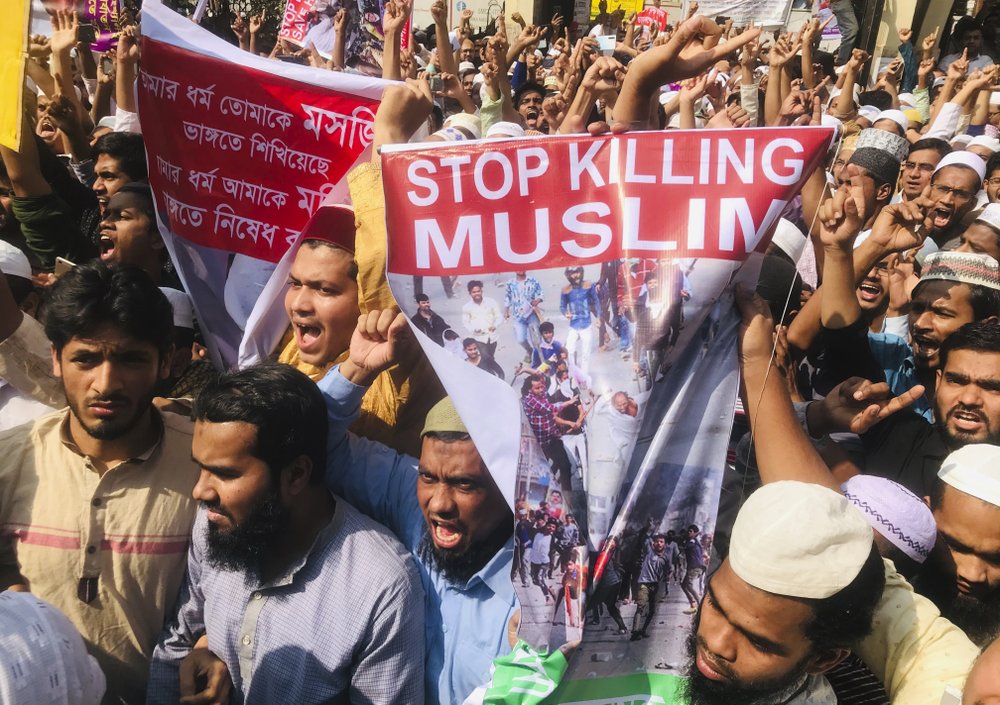By Md. Kamruzzaman
It was unpredictable that Bangladeshi people would organize such an unprecedented movement against Indian Premier Narendra Modi when he visited Bangladesh to join the country’s golden jubilee of independence and birth centenary of its founding leader Sheikh Mujibur Rahman.
The two occasions Modi was invited for were not at all controversial; rather both events were very much people-oriented at which four South Asian leaders including Bhutan, Maldives, Nepal, and Sri Lanka attended peacefully one after another amid huge festivity and utmost cordiality. Even dozens of deals of mutual benefits were signed between Bangladesh and those countries. But why the people of Bangladesh stormed out on the streets in an unbridled protest against Modi, also the leader of the closest neighbor and ally of the ruling Awami League party.

Historic basis of Bangladesh – India tie
Historically it is proved that the performance of India in treatment of its minority communities especially dealing with Muslims is not good at all. During the long British rule in the Indian subcontinent from 1857 to 1947, the experience of Muslims was mostly unpleasant with records of deprivation, discrimination, and oppression. Hindu landlords (Zamindars) in collaboration with the British occupant forces oppressed Muslims in many places. However, finally, all communities including majority Hindu and minority Muslims in the sub-continent struggled against the “divide and rule” policymakers and ultimately gained.
Before capturing power by the British intruders through their traditional conspiracy theory and with the help of some local traitors there were records of reigning the whole region by Muslims for more than 600 years. People of all communities lived in peace and harmony without any discrimination for centuries under Muslim rulers. Even during the Muslim reign members of the Hindu community were appointed in many high-profile government posts while the present Bangladesh and Pakistan were also part of the then greater India.
Unfortunately, the same Muslims were mistreated by the Indian Hindus in nexus with the British tyrants, and finally, a strong sense of separation was grown up among the Muslims, resulting in the formation of united Pakistan with Muslim majority regions. Even in the book entitled “Unfinished Memoirs” by Sheikh Mujibur Rahman, who is also considered to be the founding leader of independent Bangladesh, the issue of the deep passion of Muslims in the region to form a separate state was clearly mentioned. He has written:
“I believed that we would have to create Pakistan and that without it Muslims had no future in our part of the world.”
His faith in united Pakistan was, however, faded a lot due to the failure of the then Pakistani ruler in addressing the 1970 catastrophic cyclone in the southern coastal area of East Pakistan (Bangladesh) and not transferring power to Mujib after the 1970 election despite his victory. Though it was easier for Mujib to win the election as the then veteran politician and once a leader of Mujib, Abdul Hamid Khan Bhashani, boycotted the election showing sympathy to the unlimited sufferings of the coastal people hit by the cyclone that took lives of more than 500,000 people.
So dislike of India among Bangladeshi people is nothing new. People of this country especially the majority Muslim community have never accepted Indian hegemony and discriminatory policy. Bangladesh is also a country of harmony and peaceful co-existence of multiple ethnic communities. Except for some distant incidents, the example of mutual tolerance and multiculturalism in Bangladesh is a milestone before the whole world. For example, thousands of Buddhists have been peacefully living in different areas of Bangladesh after the August 2017 brutal crackdown on Rohingya Muslims perpetrated by the Myanmar army and some extremist Buddhists. On the other hand, there are hundreds of hate incidents and riots in India against minority Muslims. Peace-loving Bangladeshi people never like it as they do not like the policy of the Burmese military regime. The relationship between India and Bangladesh, however, reached a historic height in 1971 when Delhi wholeheartedly supported Bangladesh (the then East Pakistan) to get independence from Pakistan (the then West Pakistan).
But a section of people of Bangladesh opposed the Indian interfere in the liberation movement sensing its long-term impact based on the centuries bitter experiences of the past.
Bitter starting with ally
Bangladeshi people were stunned as Indian soldiers began a massive looting campaign throughout the country instant after gaining independence on 16 December 1971. Noted freedom fighter and one of the 11 sector commanders who led the 1971 Liberation War, Major Mohammad Abdul Jalil, has underlined the issue in his book titled “Unprotected Independence is Subordination [Arokkhita Shadhinatai Paradhinota]”.
He has written: “Trucks laden with arms, ammunition and many other valuable goods and thousands of military and civilian cars abandoned by the Pakistani forces, were taken [by the Indian army]. Even ‘private cars’ were not left. I just tried to save the private cars in the [southwestern] city of Khulna after keeping those at the city’s circuit house-ground after requisition. Before that, all cars from everywhere were crossed over the border [India]. The office and quarter of the army cantonment in [southwestern district of] Jessore were totally looted. Even, the mirrors in the bathrooms and other fittings were not untouched from the drastic looting. Peaceful pedestrians were also victimized. Such behavior of the so-called ally spread panic among the people. If the attitude of them turned so violent just after entering into Bangladesh, what would be the situation of the country and the countrymen if they stayed here longer? What type of independence have we gained through a blood-shedding war?”
Since then India continued its oppressive campaigns in most cases against Bangladesh. The country has set dams against 54 common rivers, seriously affecting the downstream country of Bangladesh despite the frequent appeal of Bangladeshi people to India for not putting barrier against the natural flow of water in gross violation of international river law. The country has never paid any heed to the lifeline issue of Bangladesh. Even Delhi has been hanging the much-awaited Teesta River Water Sharing treaty with Bangladesh for years in lame excuses.
Bangladeshi civilians are being killed by the Indian border force on regular basis. Even just five days before Modi’s Bangladesh visit, a Bangladeshi unarmed civilian was shot dead by Indian Border Security Force (BSF). On 16 December last year when Bangladesh was celebrating the country’s victory anniversary, BSF also shot down Bangladeshi civilians across the border.
According to the records of local rights and legal aid body Ain O Salish Kendra [Law and Arbitration Center], at least 49 Bangladeshi nationals, mostly unarmed civilians, have been killed along the India-Bangladesh border by the BSF in 2020. Another rights body Odhikar reported that a total of 1,185 Bangladeshi civilians had been killed by Indian border forces between 2000 and 2019.
External Affairs Minister of India Subrahmanyam Jaishankar days before Modi’s visit to Bangladesh came to Dhaka and defended the illegal killing of Bangladeshis civilians across the border claiming that the extrajudicial killings were the result of cross-border crimes. “No crimes, no killings”. Now the question is whether the punishment of border crimes is death and under which law. Is Indian BSF is the legal authority of trial? How can a person be treated as a criminal and murdered without proving before the court?
Why so hatred to Modi
So the lack of confidence and trust among Bangladeshi people towards India is long rooted. In this regard, Modi’s case is more difficult as he is globally infamous for his reported patronization in the 2002 Gujarat riots as the then Chief Minister of the province and attack on historic Babri Masjid (mosque) in 1992. Even the historic Masjid was finally demolished in the tenure of Modi in 2020.
Besides, the oppressive state policy of Delhi for above seven decades against the Muslims of India-occupied Jammu and Kashmir has reached the edge under the administration of Modi. His government also revoked the special status to Jammu and Kashmir in August 2019 that was granted under Article 370 of the Indian Constitution. This extreme step of Modi pushed the already suffocating Muslims in the region to the verge of extinction.
The recent level of intolerance to different Indian states towards Muslims as the minority people eat beef or cow meat. Many Muslims were beaten to death in broad daylight before the very nose of the Modi administration. Enactment of the controversial and anti-Muslim Citizenship Amendment Act (CAA) and threatening of ousting so-called illegal citizens mainly Bangla-language Muslims in the guise of the National Register of Citizens (NRC) have also posed a great threat to the Muslims in the country under Modi.
Thus, the people of Bangladesh were so reactive against the Bangladesh visit of Modi, who was even banned in the US until his resumption as the Prime Minister of the world’s largest democratic country.
The long-term impact of spontaneous movement
It is seen that the Hefazat-e-Islam, the largest non-political Islamic platform of Bangladesh, called for a mass movement against Modi’s Bangladesh visit. The response was so enthusiastic, reminding Modi that how much serious the Bangladeshi people are against the extreme Hindutva state policy of Modi’s Bharatiya Janata Party (BJP) that also follows the ideology of the country’s most extremist organization, Rashtriya Swayamsevak Sangh (RSS).
According to available media reports and other sources at least 14 people, mostly supporters of Hefazat, were shot dead by police and Border Guard Bangladesh (BGB) while hundreds other injured and many of the injured were reported as bullet injury fired by the law enforcers during the anti-Modi movement in Bangladesh. Hefazat also observed a countrywide strikes protesting Modi’s visit and killings of anti-Modi demonstrators.
It is very significant that on the day Bangladesh was observing the golden jubilee of independence with huge festivity, tens of thousands of Bangladeshi people held demonstrations against the premier of India, the country considered to be the closest ally of Bangladesh’s Liberation war. It proves that the Indian hegemony is no more acceptable to the mass people of Bangladesh.
India is trying to convince Bangladesh now by uttering its conventional commitments of standing by its neighbor. But the ground reality is that in an era of globalization and information technology people do not like to rely on mere commitments, they want to see the concrete result of the commitment on the ground.
Now either India must change its oppressive state policy under Modi, or lose its minimal influence over Bangladeshi people in near future.
Note:
The writer is an Asia-based prize-winning freelance journalist who mainly writes on diplomacy, refugee, human rights, and climate change. His articles have been frequently published by DND News Agency, Turkish Anadolu Agency, South Asian Monitor, and other media outlets including Aljazeera as the content of the Anadolu Agency. He can be reached at mkzbablu@gmail.com / https://twitter.com/mkbablu
Disclaimer:
The views and opinions expressed in this article/Opinion/Comment are those of the author and do not necessarily reflect the official policy or position of the DND Thought Center and Dispatch News Desk (DND). Assumptions made within the analysis are not reflective of the position of the DND Thought Center and Dispatch News Desk News Agency.

